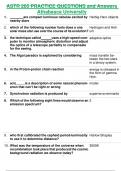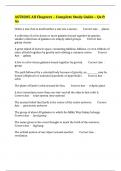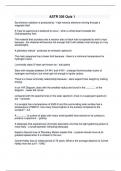Astr 205 - Study guides, Class notes & Summaries
Looking for the best study guides, study notes and summaries about Astr 205? On this page you'll find 52 study documents about Astr 205.
Page 3 out of 52 results
Sort by
ASTR 205 Short-answer Quiz 1 Athabasca University fall 2024
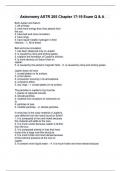
-
Astronomy ASTR 205 Chapter 17-19 Exam Q & A
- Exam (elaborations) • 18 pages • 2023
-
Available in package deal
-
- $10.00
- + learn more
Both Jupiter and Saturn 1. All of these 2. emit more energy than they absorb from the sun. 3. have belt and zone circulation. 4. have rings. 5. have liquid metallic hydrogen in their interiors. - 1. All of these Belt and zone circulation 1. has been observed only on Jupiter. 2. is caused by rising and sinking gases. 3. explains the formation of Cassini's division. 4. is more obvious on Saturn than on Jupiter. 5. is caused by the planet's magnetic field. - 2. is caused by rising a...
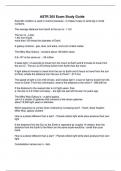
-
ASTR 205 Exam Study Guide
- Exam (elaborations) • 14 pages • 2023
-
Available in package deal
-
- $10.00
- + learn more
Scientific notation is used in science because - it makes it easy to write big or small numbers. The average distance from Earth to the sun is - 1 AU The sun is - a star 1 AU from Earth. more than 100 times the diameter of Earth. A galaxy contains - gas, dust, and stars, and a lot of dark matter. The Milky Way Galaxy - contains about 100 billion stars. 2.9×107 is the same as - . 29 million It takes light 1.3 seconds to travel from the moon to Earth and 8 minutes to travel from the s...
ASTR 205 PRACTICE QUESTIONS and Answers Athabasca University
VALUE PACK:- ASTR 205 EXAMS
Astronomy ASTR 205 Exam Bundle with Complete Solution 2023
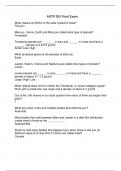
-
ASTR 205 Final Exam
- Exam (elaborations) • 7 pages • 2023
-
Available in package deal
-
- $10.00
- + learn more
What makes up 99.8% of the solar system's mass? The sun Mercury, Venus, Earth and Mars are called what type of planets? Terrestrial Terrestrial planets are ________ in size and ______ in mass and have a _______ density of 3.9-5.5 g/cm3 Small; Low; High What terrestrial planet is the densest of them all. Earth Jupiter, Saturn, Uranus and Neptune are called what types of planets? Jovian Jovian planets are ______ is size, ______ in mass and have a _______ density of about 0.7-1...

-
ASTR 205 Astronomy Chapters 1, 2, and 3
- Exam (elaborations) • 7 pages • 2023
-
Available in package deal
-
- $10.00
- + learn more
A solar system contains - the sun and the non luminous objects that orbit it, including the planets, comets, and asteroids field of view - the region you can see in an image planet - non luminous object, larger than a comet or asteroid, that orbits a star star - celestial object composed of gas held together by its own gravity and supported by nuclear fusion occurring in its interior AU - astronomical unit that is the average distance from the Earth to the sun light year - distance ligh...
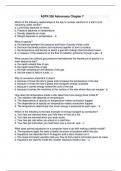
-
ASTR 205 Astronomy Chapter 7
- Exam (elaborations) • 5 pages • 2023
-
Available in package deal
-
- $10.00
- + learn more
Which of the following relationships is the key to nuclear reactions in a star's core remaining under control? a. Luminosity depends on mass. b. Pressure depends on temperature. c. Density depends on mass. d. Weight depends on temperature. - b What is opacity? a. the balance between the pressure and force of gravity inside a star b. the force that binds protons and neutrons together to form a nucleus c. the temperature and density at which a gas will undergo thermonuclear fusion d. a...
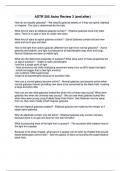
-
ASTR 205 Astro Review 3 (and after)
- Exam (elaborations) • 4 pages • 2023
-
Available in package deal
-
- $10.00
- + learn more
How do we classify galaxies? - We classify galaxies based on if they are spiral, elipitical or irregular. The size is determined be the halo. What kind of stars do elliptical galaxies contain? - Ellipitcal galaxies have only older stars. There is no gas or dust to create new stars. What kind of stars do spiral galaxies contain? - Spiral Galaxies contain old and new stars and much gas and dust. How is the light from active galaxies different from light from normal galaxies? - Active ga...

Did you know that on average a seller on Stuvia earns $82 per month selling study resources? Hmm, hint, hint. Discover all about earning on Stuvia


